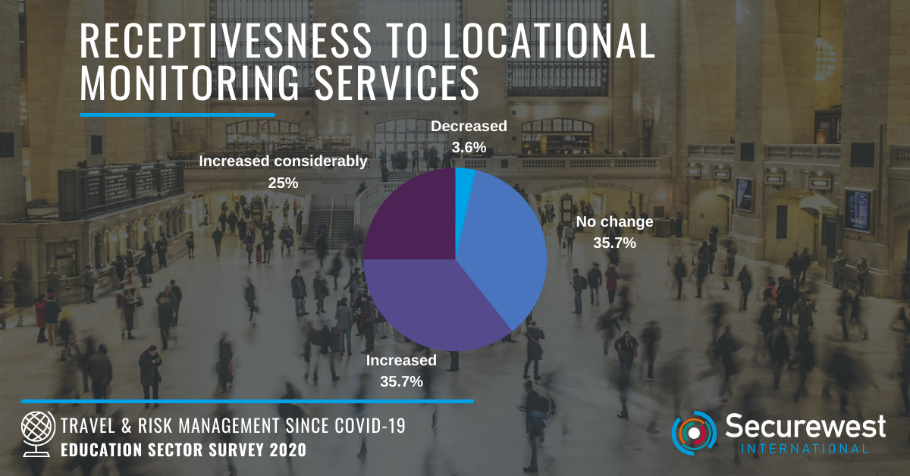Managing the expectations of Travel Risk Managers
At the heart of an effective Travel Risk Management program, it is generally agreed by both Travel Risk Managers and global assistance specialists that an organisation needs to be able to:
- prepare themselves and their travellers for business travel, through a clear policy, pre-travel risk awareness training and risk assessments. They also need the services of a dedicated Travel Management Company and an insurance policy that as well as providing standard cover, also covers Covid-19 – treatment, repatriation, costs for destination country quarantine etc
- provide alerts and warnings specific to their travellers location and vulnerabilities
- be able to locate and communicate with their travellers and mobile employees in real-time
- be able to provide 24/7 emergency response services, either in house or through a 24/7 global assistance company
A good global assistance company will be able to support any organisation with all the above, doing the heavy lifting, providing expert guidance, policy writing, pre-travel risk assessments, travel risk awareness training and will also ensure policies and services are aligned between insurers, TMCs and their own services. They can also provide the technical solutions– typically through an app through which the traveller receives alerts (health and security), country information, health considerations, immigration requirements. The app should also be able to deliver real-time location services through the destination country’s mobile network, and a 24/7 call function through to their Response Centre.
In our experience, where we see the disconnect, is that Travel Risk Managers need to understand the limitations of what global assistance companies (and their technical solutions) can, and cannot, do. The below should help to manage these expectations:
- Information limitations There is sometimes an expectation that global assistance providers can deliver perfect knowledge and clarity in circumstances where information is unreliable or scarce if not non-existent; and they often expect clarity on how situations might evolve, when conditions are confused if not inherently unknowable. The best assistance providers can work with a range of possible outcomes (most likely case, plausible worst case etc) rather than expecting certainty
- Legal constraints Remember assistance companies obey the laws of physics as well as the laws of the land, the air and sea: they can’t fly black helicopters into countries with closed airspace, even if they had black helicopters already poised in a neighbouring country
- Third-Party Ground providers No global assistance company can claim a presence in every country on the planet – Fact. Some may have offices in many countries, but that does not mean they can deliver meet and greet, transport services etc. Every global assistance company relies on a network of local service providers. Most of these local companies in turn provide services to multiple global assistance companies. This works well during normal times, but in the event of a crisis they are in high demand and prices will almost certainly increase. You will have to pay extra for these services, outside of your annual membership. Typically, global assistance providers will have vetted the local provider – adequate insurance, vehicle status, licences to operate in country etc – and they will refer their clients to these providers at cost + a percentage.
- Limited Resources for support – TRMs must accept that there are some places in the world such as Uzbekistan and Turkmenistan where there are very limited options for providers, and the few that are appropriate will be expensive. Language limitations will also provide an additional limitation.
- Culpability Global Assistance Companies can outsource tasks but not responsibility for decision making – this sits with the client organisation based on recommendations and advice given by the assistance company
- Service limitations your assistance company can tell you what has happened and where your people are, and they can make basic recommendations about what to do – but they won’t do it for you as part of your annual subscriptions unless you pay extra for the service.
- Airline Recommendations there are some places where there are no ‘reputable’ airlines with EU standard safety records. Your provider cannot choose a carrier for you but can give you context for your decision such as do the risks of overland travel (road conditions, conflict etc) outweigh the risks of air travel?
- Duty of Care vs Duty of Loyalty It is generally agreed that an organisation has a duty of care to its mobile employees and expatriate workers and will take every reasonable step to ensure their health, safety, and well being. By return their employees need to be aware that, once their company implements risk mitigation and management plans and procedures, they then have a duty of loyalty to adopt and adhere to those plans and procedures. This would include downloading and adopting any technical solutions. Put simply, if a traveller does not download and activate their app it is nigh on impossible to deliver the full scope of travel safety support to them.
 Location services (Traveller Tracking) Tracking has historically been regarded as an intrusive term impacting on travellers right to privacy. This has started to change significantly with a post Covid-19 survey conducted by Securewest on the education sector (both travellers and those responsible for safe travel) showing that respondents receptiveness to location monitoring services had increased by 35.7%, and increased significantly by 25%. With regards to Data Privacy there is now more of an understanding and acceptance among employees that their companies will be acting in their best interests by conducting targeted searches to geo-locate them in real-time, in the event of a critical incident, so the data privacy argument is now less of a contentious issue.
Location services (Traveller Tracking) Tracking has historically been regarded as an intrusive term impacting on travellers right to privacy. This has started to change significantly with a post Covid-19 survey conducted by Securewest on the education sector (both travellers and those responsible for safe travel) showing that respondents receptiveness to location monitoring services had increased by 35.7%, and increased significantly by 25%. With regards to Data Privacy there is now more of an understanding and acceptance among employees that their companies will be acting in their best interests by conducting targeted searches to geo-locate them in real-time, in the event of a critical incident, so the data privacy argument is now less of a contentious issue.
There are three current approaches to providing location services, not including satellite tracking:
- Itinerary based – this approach is based on traveller itineraries (flights, hotels and in some cases trains) and Passenger Name Records (PNR) which are loaded onto the travel tracking platform through a Global Distribution System (GDS). Itinerary based bookings are very good for pre-travel authorisation, pre-travel briefings. The downside is that itinerary based tracking only gives an indication as to where the traveller should be and does not give a real-time location. As a point to note, European Trains still cannot be accurately captured unless entered into the system manually by an administrator (client, TMC or global assistance provider)
- Mobile Live – GPS tracking through 4G mobile network of a travellers device using in app location services. Typically, this is an opt in service where the traveller can decide whether they want their location to be known. This is the most reliable and gives real-time location services, but mobile data roaming needs to be enabled which can be costly. Consideration also needs to be given to the fact that a device cannot be tracked if there is no mobile network available in some locations. If in a high-risk location with limited mobile network coverage, TRMs should consider satellite tracking.
- Itinerary & Mobile Live – some global assistance providers offer systems which are able to capture both itineraries and mobile real-time, delivering a catch all solution with fall back in the event that one or the other fails – this could be in a country where the mobile network is shut down by the government as happened in India. India experienced 154 network shutdowns between January 2016 and May 2018 according to Forbes.
Having a single, dedicated Travel Management Company and comprehensive Business Travel Insurance is critical to a business’ Travel Risk Management solution, but unless this can be administered in-house 24/7 it can only be completed with access to a dedicated global assistance provider.
When selecting a global assistance provider, organisations should conduct in-depth due diligence based on the above, and ask them how and what they can achieve ‘at scale’ such as a mass casualty natural disaster, when every other company and government is trying simultaneously to find in-country ground support and space on aircraft for evacuations.
The belief that by simply signing up for the services of an assistance provider means they are fully covered is misleading – organisations will still have to have their own internal response plans, policies and procedures aligned and in place as part of their Crisis Management Plans – again, a good global assistance provider can support with these.
About Securewest
We have been supporting our clients for over 30 years and continue to do so throughout the current pandemic. If you would like to find out more about our Travel Risk Management services click here or if have any questions about the above article please contact our team.

 Location services (Traveller Tracking) Tracking has historically been regarded as an intrusive term impacting on travellers right to privacy. This has started to change significantly with a post Covid-19 survey conducted by Securewest on the education sector (both travellers and those responsible for safe travel) showing that respondents receptiveness to location monitoring services had increased by 35.7%, and increased significantly by 25%. With regards to Data Privacy there is now more of an understanding and acceptance among employees that their companies will be acting in their best interests by conducting targeted searches to geo-locate them in real-time, in the event of a critical incident, so the data privacy argument is now less of a contentious issue.
Location services (Traveller Tracking) Tracking has historically been regarded as an intrusive term impacting on travellers right to privacy. This has started to change significantly with a post Covid-19 survey conducted by Securewest on the education sector (both travellers and those responsible for safe travel) showing that respondents receptiveness to location monitoring services had increased by 35.7%, and increased significantly by 25%. With regards to Data Privacy there is now more of an understanding and acceptance among employees that their companies will be acting in their best interests by conducting targeted searches to geo-locate them in real-time, in the event of a critical incident, so the data privacy argument is now less of a contentious issue.